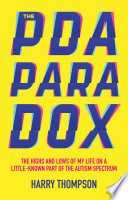Harry Thompson’s book, “The PDA Paradox: The Highs and Lows of My Life on a Little-Known Part of the Autism Spectrum,” is a memoir and coming-of-age story about how he learned to navigate the world as an autistic assigned male at birth. He classified his upbringing as financially privileged, and he originates from the United Kingdom. Most of his book is devoted to his childhood and navigating school bureaucracies.
Before getting into the “The PDA Paradox,” let’s define PDA, which stands for Pathological Demand Avoidance Syndrome. Thompson prefers to define it as “an instinctual desire to be free” or “an anxiety-driven need to remain in control.” Autistic people with this type of autism, which is not an official DSM classification, are more interested in people and care more about the best way to do things than respecting hierarchies or rules that are not practical or realistic. Thompson summarizes, “The Neurotypical pisses off the Autistic by telling them a lie. And the Autistic pisses off the Neurotypical by telling them the truth.” Thus why masking, a “norm suit,” hurts, but a PDAer immersed in an unsafe environment will appear to comply to stay in control or appear to fawn. According to his standards, Thompson was in safe environments and appeared to rebel.
Most of the reviews are positive. These readers appear to be neurotypical and are excited to get insight into the mindset of an autistic person. Neurodivergent positive reviews are delighted that Thompson articulated their experiences. There are fewer negative reviews, but they fall in a couple of categories: readers who disapprove of Thompson’s antisocial behavior or were looking for a more general analysis of PDA. So depending on how you are approaching his memoir, it will affect your reception of “The PDA Paradox.” If I had known this going in, I probably would have skipped it.
“The PDA Paradox” is well-written. Thompson chose to take a chronological instead of thematic approach, which is my preference. Unfortunately he devotes less time to his adult experiences than his childhood. Most writers do not get published so he obviously found his footing. The book is devoted to his missteps and epiphanies, but not his successes and how he got there. There is no narrative reward for seeing him at his low points. Just like his low points are specific to his experience, his high points would be too. I am not looking for a self-help book to guide me, but the book’s narrative is imbalanced. It could be because Thompson does not feel his successes are as germane as his struggles, or he does not feel them as keenly. He details each negative turn, but summarizes his accomplishments.
Thompson does not give the impression of a person who suffers from internalized ableism or is self-deprecating. His demeanor gives the hubris vibe of a twenty-something male philosophy major, but there is some dissonance revealed in his story. I would not dismiss his story by only saying that he feels perpetually aggrieved because he lays a solid, objective foundation for the ways that the system failed him. People who dismiss his allegations of a flawed system because of his behavior adhere to respectability politics. By stopping at examining the system and the resulting negative behavior, Thompson does not give a full picture of how he was able to survive and thrive despite systematic problems and negative coping mechanisms. A second book is about to be published so maybe this choice is deliberate, but I am less inclined to buy it because of the failure of creating a solid denouement. It is a basic construction flaw, and his editors failed him.
I stumbled on Thompson’s TikTok page around April 2021, related to a lot of his content and bought his book soon thereafter. It would take me almost a year to read it, not because he is not an absorbing writer, but because his TikTok content is more generalized about raising awareness about PDA whereas “The PDA Paradox” is about his experiences, which were less relatable, especially to me as a rule-follower. If Thompson belonged to even a slightly different demographic—class, race, nation, gender, he would probably be misdiagnosed and/or criminalized, especially when some of his behavior may have violated the letter of the law even if self-medicating was his motivation. Some of his physical behavior cannot be excused in a similar fashion.
As I viewed more of his lengthier content (TikToks run one to three minutes), my feelings about Thompson shifted until the fall of 2021 when he was construed as cosigning a self-professed narcissist and abuser. While I think that when applied generally, his content has value, being cautious about conflating his experience of PDA with anti-social, possibly abusive, behavior is dangerous. If I have learned anything about my journey with autism, it is that a call to justice is strong for us, and neurodivergence is not an excuse for intentionally harmful behavior. While we may flip metaphorical tables to pursue justice and subvert social mores to create a better world, we do not do so to inflict injury for our own pleasure. I am not saying that Thompson does this, but by associating with people who do, it tarnishes his platform.
“The PDA Paradox” is a decent book, but it lacks momentum, has structure flaws, and failed to hold my interest. Disclaimer: long before this book, I found my reading consumption has dropped precipitously, but this book did not help. Thompson shows potential, but for his next book, I will borrow it from the library.





